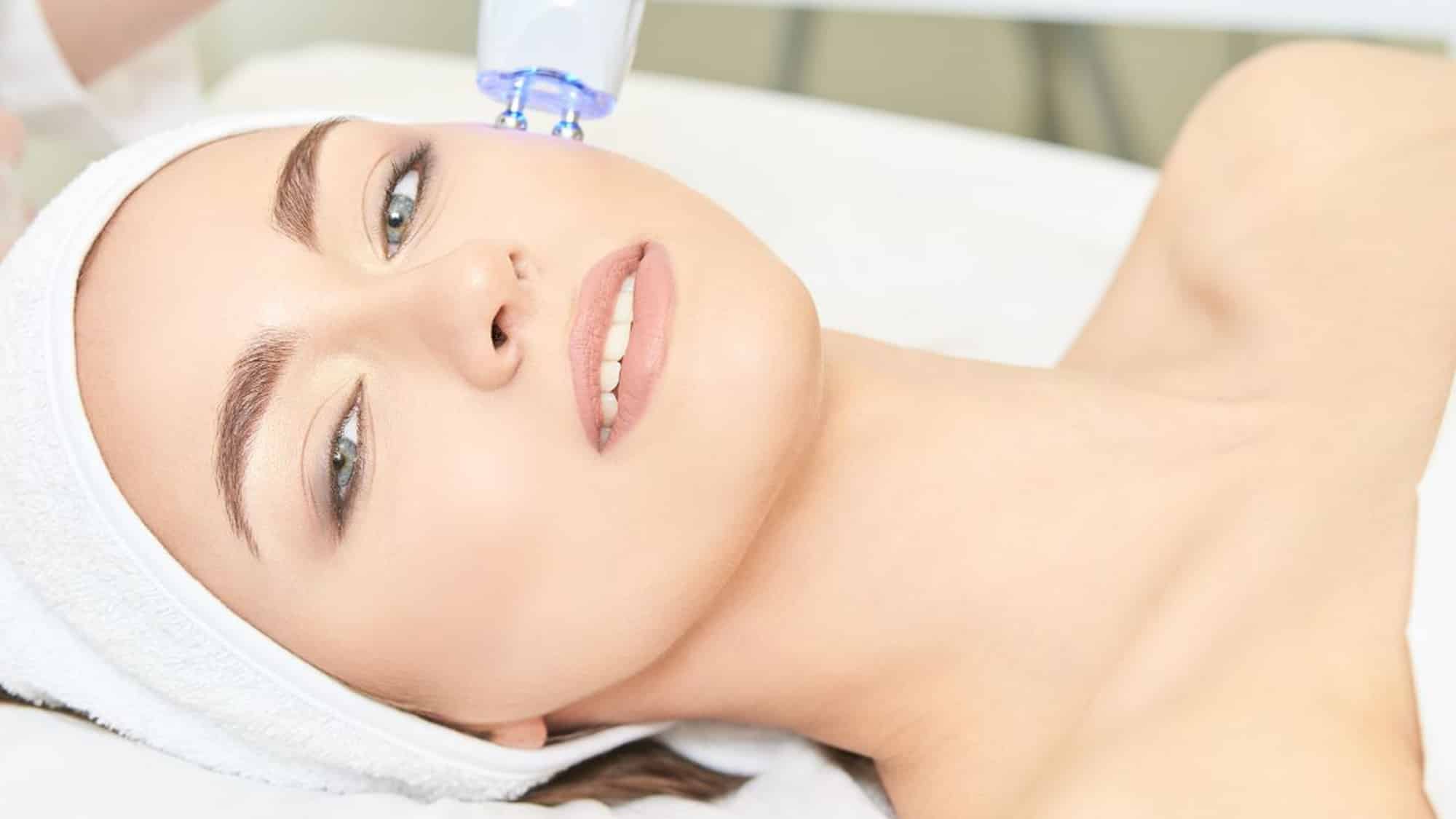
Is Laser Skin Rejuvenation Safe? Exploring the Side Effects
Laser skin rejuvenation is generally considered safe when performed by a qualified professional, but it can take time and may have some minor side effects. This article explains the possible complications of laser skin rejuvenation therapy. We will look at redness and swelling, changes in skin sensation, and differences in skin color, and why it’s important to understand all the risks linked to the facial laser treatment you choose.
What You Need to Know about laser skin resurfacing
Laser skin rejuvenation which is also referred to as laser skin resurfacing is a cosmetic procedure that is used in the treatment of the skin. This method utilises a relatively modern form of laser technology on specific skin complaints including age spots, fine line, blotchy skin, and skin that is damaged by the sun. It includes utilization of laser light to eliminate outer layers of skin and incite skin to generate collagen to create better and smooth skin tone.
The Safety of Laser Skin Rejuvenation
Laser skin rejuvenation is generally considered safe when performed by a qualified professional. However, as with any cosmetic procedure, there are potential risks and side effects to consider.
The safety of the treatment depends on factors such as the type of laser used, the skill of the practitioner, and the individual’s skin type and medical history. For example, people with darker skin tones or conditions like active acne or a history of cold sores may be at a higher risk of complications. Understanding these factors is essential for a safe and effective treatment experience.
Laser Skin Rejuvenation BEFORE AND AFTER
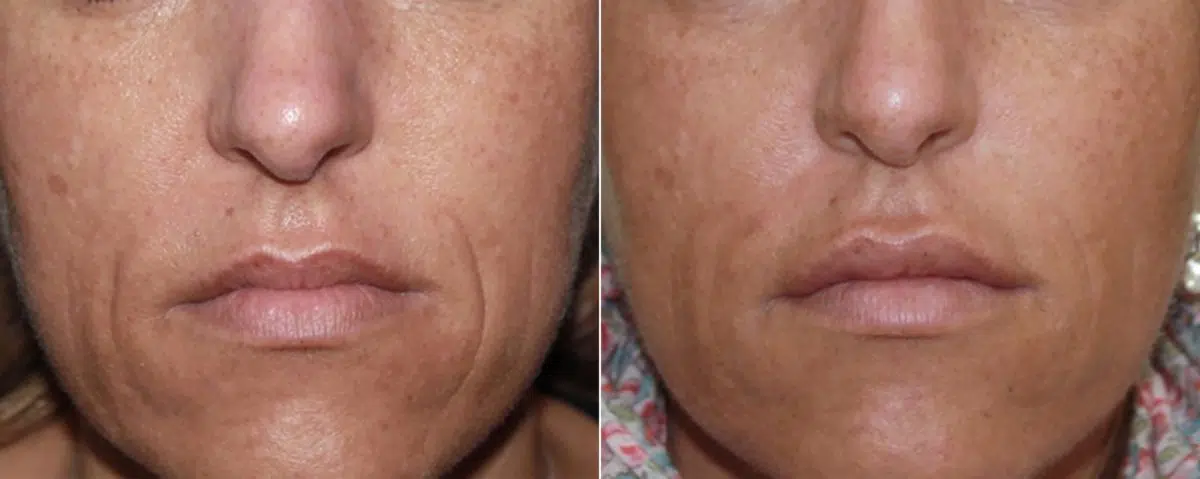
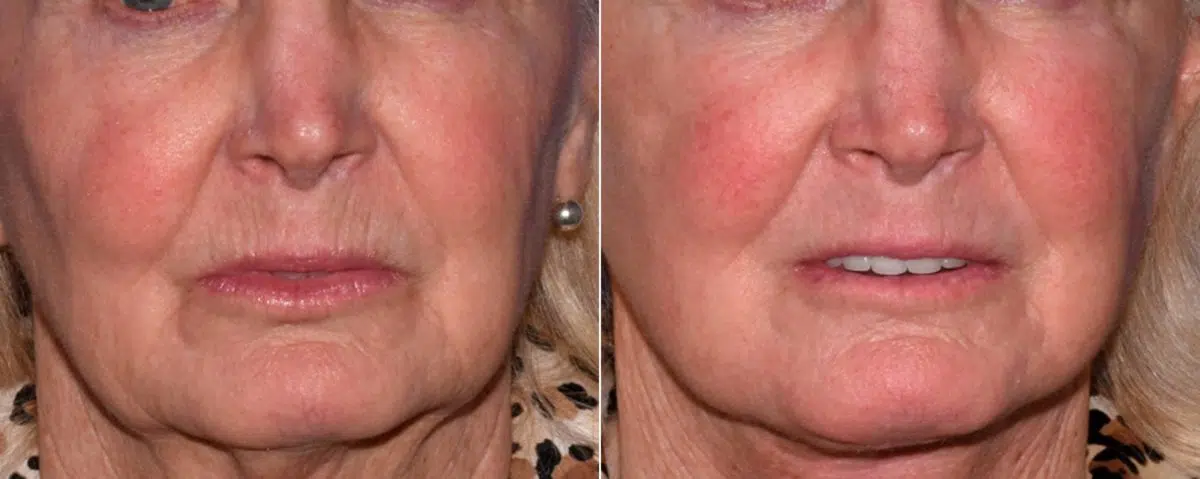
*Each patient is unique and individual results may vary.
Possible Side Effects of Laser Skin Rejuvenation
1. Redness and Swelling After Laser Treatments
After undergoing treatment, redness and swelling are common effects often observed on the skin. These effects are usually temporary, appearing as a response to the skin’s repair process. Redness and swelling occur as the skin begins to heal and renew itself.
The extent of redness and swelling can vary, depending on the treatment and an individual’s skin sensitivity. Certain skincare products or medications may also intensify these effects.
Remember, these effects are normal. However, if they persist for an extended period, seek medical advice.
2. Changes in Skin Sensation After Laser Treatments
After a skin treatment, your skin might feel more sensitive or less sensitive than usual. These changes are usually temporary and improve as your skin heals. Sensations can range from mild tingling to a sunburn-like feeling.
To manage skin sensitivity, keep your skin hydrated with moisturizers and avoid scratching irritated areas. Most changes will resolve on their own, but if they persist, consult your dermatologist to prevent further issues.
3. Hyperpigmentation and Hypopigmentation Risks From Laser Treatment
Changes in skin color can occur after laser skin rejuvenation. Hyperpigmentation refers to the darkening of skin, while hypopigmentation involves the lightening of areas. Both are possible side effects of the procedure, typically resulting from post-inflammatory responses within the skin.
Avoiding direct sunlight and using a high-protection SPF during the healing process can help prevent these occurrences. Every skin reacts differently to treatment. Thus, a careful assessment before undergoing the procedure can help predict possible skin reactions. Remember, always entrust your skin to a certified professional to ensure proper aftercare and prevention of these side effects.
4. Bacterial Infection Risk After Laser Treatments
Post-procedure bacterial infections are a known risk of laser skin rejuvenation. Contact with unsterilized equipment or the inadequate cleaning of the skin beforehand can lead to an occurrence. Patients are usually prescribed antibiotics prophylactically to guard against this possibility.
Conversely, a patient’s existing skin conditions may increase vulnerability to bacterial infections. Thus, maintaining a clean skin surface, pre and post-procedure, is essential in reducing this risk.
5. Scars and Marks After Laser Skin Procedures
A rare but noteworthy side effect of skin treatments is scarring. Despite advanced technology and skilled professionals minimizing this risk, scarring still occasionally occurs. This adverse effect alters the skin’s appearance, often seemingly contrasting with the desired rejuvenation effect.
The key to avoiding scarring is post-care diligence. Appropriate skin care prevents unnecessary scarring. However, remember that each individual’s skin responds differently. Some people’s skin may naturally be more prone to scarring than others. It is advised to discuss this possibility with a certified professional before the procedure.
Remember, the ultimate objective is an enhanced appearance with rejuvenated, scar-free skin.
Restore Your Radiance Safely with Dr. Frankel
Experience safe and effective laser skin rejuvenation for smoother, refreshed skin. Book your consultation with Dr. Frankel today!

How to Prevent Side Effects From Laser Skin Rejuvenation
Ensuring the safety and effectiveness of laser skin rejuvenation involves several precautionary measures, both before and after the procedure. Dr. Frankel emphasizes the importance of these steps to minimize potential risks and maximize the benefits of laser skin rejuvenation.
Best Practices Before a Laser Procedure
- Medical Evaluation: A thorough medical evaluation is crucial. Dr. Frankel assesses the patient’s skin type, medical history, and any existing skin conditions. This evaluation helps in determining the suitability of the patient for laser treatment and in identifying any potential risks.
- Avoiding Certain Medications and Supplements: Patients are advised to avoid medications that can increase bleeding, such as aspirin or ibuprofen, and certain supplements that may affect healing.
- Managing Pre-Existing Skin Conditions: For patients with a history of cold sores or bacterial infections, Dr. Frankel may prescribe antiviral or antibiotic medication as a preventative measure.
Best Practices for Recovery after a Laser Procedure
For an efficient recovery with minimal discomfort after laser skin rejuvenation, it’s advised:
- Cold Compresses and Ice Packs: Immediately following the treatment, applying cold compresses or an ice pack can significantly reduce swelling and alleviate discomfort. This should be done gently to avoid irritating the treated skin.
- Elevation During Sleep: Sleeping with the head elevated using an extra pillow can help minimize swelling, particularly after extensive treatments like full-face procedures.
- Gentle Skin Care: It’s crucial to treat the skin delicately after a laser procedure. This includes using a mild, non-abrasive cleanser and patting the skin dry instead of rubbing it. Avoid using any exfoliating agents or abrasive sponges during the recovery phase.
- Moisturization: Keeping the skin well-moisturized is essential. Your surgeon may recommend specific healing ointments or creams to support skin recovery. These products help maintain hydration and can aid in the healing process.
- Sun Protection: Sun exposure can significantly impact the healing process and the overall results of laser skin rejuvenation. Patients are advised to use a broad-spectrum sunscreen with an SPF of 30 or higher and to wear protective clothing when outdoors.
- Avoiding Makeup: refraining from makeup until the skin has healed sufficiently. This helps to prevent potential irritation and allows the skin to recover without any impediments.
- Hydration and Nutrition: Adequate hydration and a balanced diet can enhance the body’s natural healing process. Drinking plenty of water and consuming nutrient-rich foods support overall skin health and recovery.
- Avoiding Strenuous Activities: It’s important to avoid heavy physical activities and exercise for a few days post-treatment. Excessive movement or sweating can exacerbate swelling and prolong the healing process.
Laser Skin Rejuvenation BEFORE AND AFTER
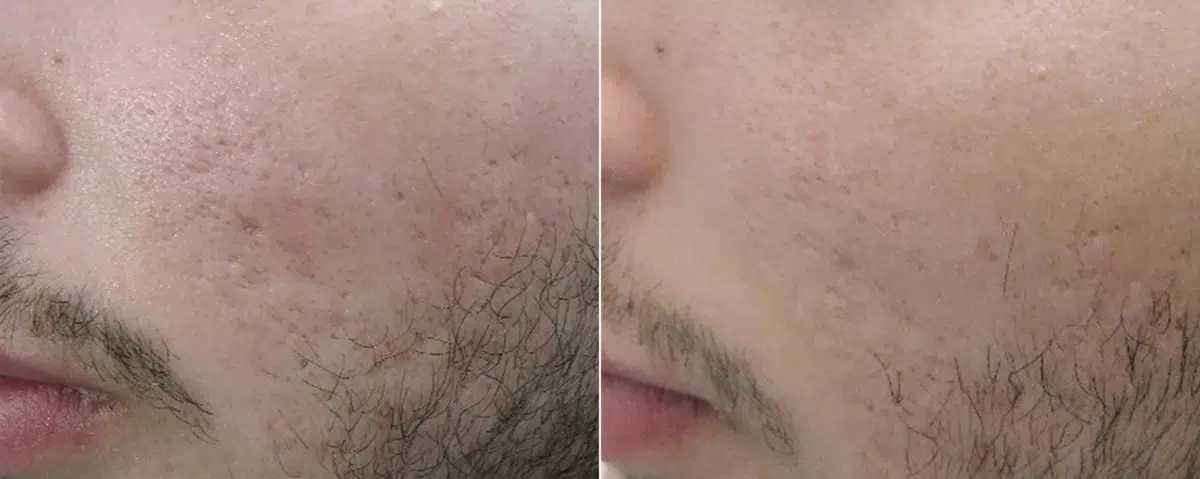
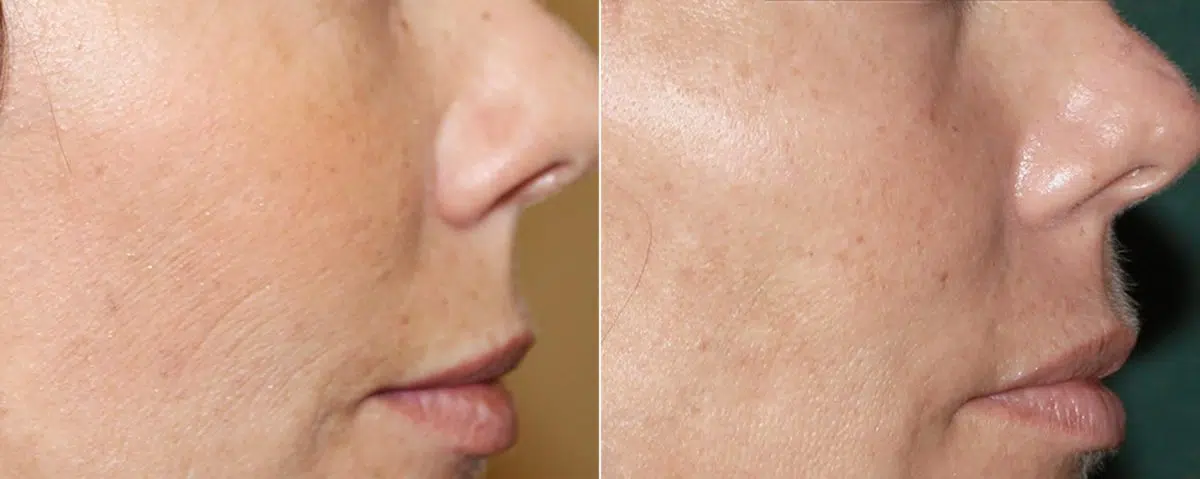
*Each patient is unique and individual results may vary.
How Long Do Side Effects from Laser Resurfacing Last?
The duration of laser skin rejuvenation side effects varies. Redness and swelling usually subside within a week. Changes in skin sensation can persist but gradually reduce over time taking several weeks to normalize.
The time it takes for hyperpigmentation and hypopigmentation depends significantly on your skin’s natural healing speed. It could take a few weeks to several months. Bacterial infections, if any, need immediate medical attention and can potentially extend the healing time. Scarring is usually permanent but may lessen in appearance over time.
Please remember that everyone’s skin reacts and heals differently. It is essential to consult with your skincare professional for a personalized timeline.
The Importance of Proceeding with a Board-certified plastic surgeon
Pursuing treatment with a certified professional dramatically minimizes potential risks. These practitioners possess the requisite skills for employing adequate safety measures during procedures, critically important when working with your skin. Trained professionals constantly update their knowledge base, reducing the odds of unwanted side effects since they’re highly informed about recent advances and potential pitfalls. Plus, their experience means they’ve refined their technique over time, providing reassurance to patients and reinforcing the importance of this responsible choice.
Always opt for a certified expert, your skin’s well-being deserves nothing less. No list or table illustrates this better than the confidence and peace of mind you will gain.
In conclusion, laser skin rejuvenation can be a safe and effective solution for those looking to address specific skin concerns. However, it is important to seek treatment from a certified professional like Dr. Andrew Frankel who has the experience necessary to minimize potential risks and ensure optimal results. For the best possible outcome with laser skin rejuvenation, we encourage you to book a consultation with Dr. Frankel.
FAQs about Laser Skin Resurfacing Risks
People with active skin infections, certain medical conditions, or very dark skin tones might not be ideal candidates. It’s always best to consult with a specialist like Dr. Frankel to see if it’s right for you.
Yes, like any procedure, but with an experienced professional like Dr. Frankel, these risks can be minimized. Potential issues include scarring, changes in skin color, or infection.
Absolutely. Too many treatments can damage your skin, leading to irritation or increased sensitivity. It’s important to follow a treatment plan tailored to your skin’s needs.
There are other ways to treat skin, but laser treatments are a safe and effective option for improving skin texture, reducing wrinkles, and addressing pigmentation issues. Consulting with experts like Dr. Frankel can help you decide if this is the right approach for your skin goals.

